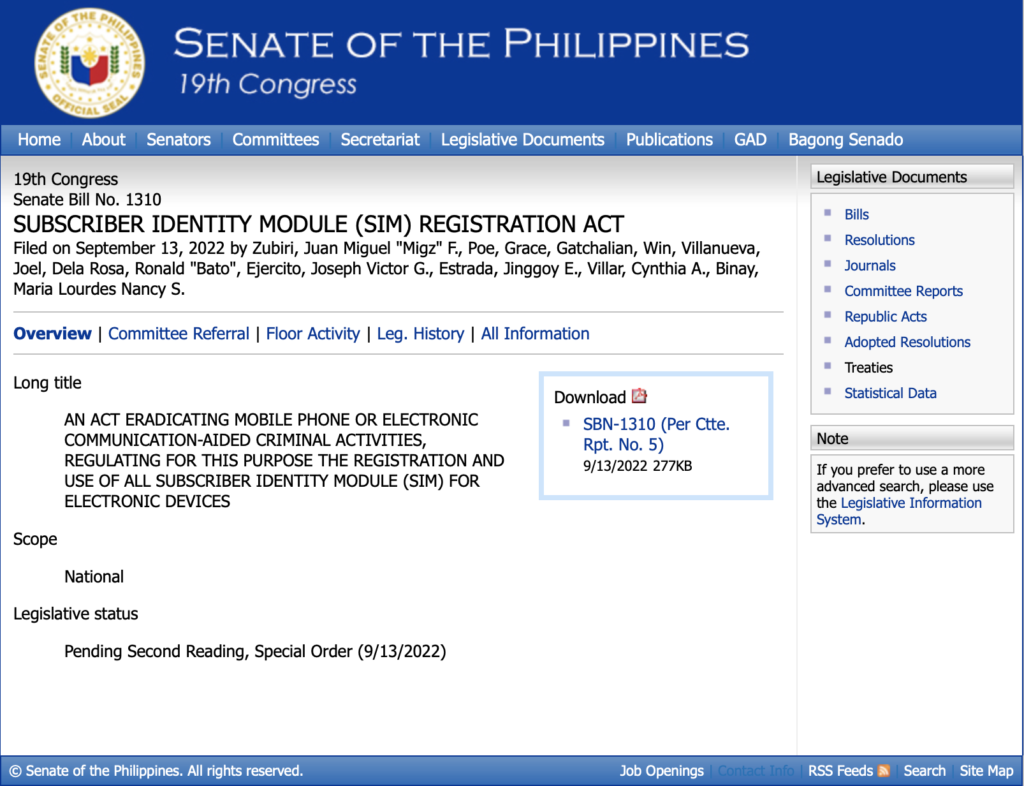THREE senators pressed for quick passage of the subscriber identity module (SIM) card registration bill that Congress is rushing amid the alarming rise in digital-enabled SIM scams.
Senator Jinggoy Estrada said a SIM registration Law will be “a valuable crime prevention strategy and cyber-defense capability,” adding it will effectively arm the Philippines against cross-border crimes use SIM cards.
Requiring registration of all SIM cards in the country to help not only in crime investigation and solution of law enforcement agencies, will help improve the government’s cyber-defense capabilities as well, he said.
In co-sponsoring timely Senate plenary passage of SB 1310 to thwart SIM card-enabled crimes, Estrada noted that “these text scams and spams surpass a mere breach of privacy and safeguard from intrusions!”

Estrada cited a report the Department of Information and Communications Technology (DICT) obtained that “leads indicating that the source of personalized text scams or unsolicited text messages are based abroad.”
The DICT is now coordinating with its international counterparts. Estrada noted that “as what our law enforcers have said in our public hearing, this text scam modus operandi has been around as far back as 20 years.”
As of February 2022, at least 98.8 percent of Filipinos aged 16 to 64 own any kind of mobile phone, adding: “By estimates, let us compute it this way—we are 110 million Filipinos today. Assuming that 55 million out of the 110 million Filipinos who have one mobile number, receive an average of three spam text messages per day—that is 165 million spam-scam text messages a day, that have already evaded the blocking capabilities of both Globe and Smart telecommunications.”
The senator said this “gives us almost 4.95 billion spam text messages that we receive on a monthly basis. Multiply by 12 months, that is a whopping 59.4 billion chances of being scammed thru these pestering text messages! And it only takes one inadvertent click out of these 59.4 billion text attacks in a year for your mobile security to be compromised or for you to be scammed!”
Estrada recalled that as early as 2001, law enforcement agencies have called for the institutionalization of the registration of prepaid SIM cards as a crime prevention strategy.
Preying on jobless
Also at Tuesday’s plenary, Majority Leader Joel Villanueva did not hide his dismay over the proliferation of text scams, which he said, prey on poor unemployed individuals.
In his co-sponsorship of SB 1310, Villanueva noted that with unemployment rate at 5.2 percent this July, jobless individuals need real opportunities and not scams.
“This representation is particularly upset by recruitment text scams or smishing because they feed on the desperation of unemployed Filipinos who are tricked to part with their personal information and money in order to land a non-existent job,” the senator said, ruing that “unfortunately, these acts are made possible, thanks to the anonymity in SIM card ownership—an anonymity that has been exploited by criminals.”
Villanueva, noting that there are 162.7 million subscribers of Globe, Smart and DITO telecommunications, warned: “These 162.7 million subscribers are the potential pool of victims and we could just imagine the disaster it will bring if we don’t do anything to stop these perpetrators.”
At the same session, Senator Ronald dela Rosa also delivered a co-sponsorship speech, and thanked Sen. Grace Poe, chairperson of the Committee on Public Services, for fast-tracking the report on the bill that was originally vetoed by then President Rodrigo Duterte and then revived by lawmakers as digitally enabled scams soared the past few months.
At one point during interpellations of Senator Poe, no less than Senate President Juan Miguel Zubiri reported that he had received at least 10 unwanted text messages in just that one session day.
In co-sponsoring the bill, Dela Rosa explained that besides the scammers, he sees the measure as necessary to fight terrorism.
The first paragraph of Section 4 of the proposed SIM Registration Act shows the principal objectives of the bill, dela Rosa said: “In order to deter the proliferation of Subscriber Identity Module [SIM] or electronic communication-aided crimes, such as, but not limited to: terrorism, text scams, unsolicited, indecent or obscene messages, bank fraud, and massive disinformation, all Public Telecommunications Entity shall require the registration of SIM as pre-requisite to the activation thereof.”
The bill’s goal to prevent terrorism activities, said Dela Rosa, is anchored on the data from the Philippine National Police, from January 2019 to February 2021, there have been 14 bombing incidents involving improvised explosives devices (IED) that used cellphone as switching or triggering mechanism according to the PNP’s Philippine Bomb Data Center.
It adds that at least 39 Filipinos died and 206 were injured in those cases, he noted. “But I want to tell you that these are not mere statistics. They are people—a parent to a child; a son or a daughter; a brother or a sister,” the senator stressed. -Butch Fernandez/ Business Mirror

